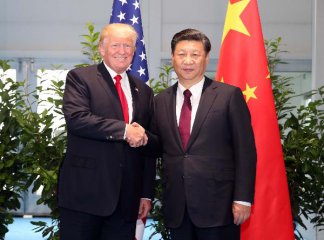WASHINGTON, Aug. 20 (Xinhua) -- U.S. President Donald Trump said Tuesday he is considering multiple tax cuts to bolster the economy that experts fear will enter into recession, a view the president denied.
Talking to reporters at the White House, Trump said he is thinking about reducing capital-gains taxes by indexing them into inflation, as well as enacting payroll tax cuts.
"We've been talking about indexing for a long time, and many people like indexing," Trump said. "It can be done directly by me."
Under the current tax policy, households owe taxes on the full nominal value of certain capital gains, and the potential change would index the asset basis to inflation, thus exempting those gains that are a result of inflation from being taxed and leaving only real value of any capital gain as taxable income.
The Penn-Wharton Budget Model's analysis suggests that the proposal would cost 102 billion U.S. dollars over the next decade. The research team said in a study published on March 23, 2018 that "high-income households would benefit most" from the policy change.
Trump said he "would love to do something on capital gains... That's a big deal; it goes through Congress."
On payroll taxes, the president said it is "something that we think about and a lot of people would like to see that, and that very much affects the workers of our country." Payroll taxes are usually used to fund social safety net programs such as Social Security and Medicare.
Trump was later challenged by a reporter who asked if the country can afford further tax cuts, given that it is already running some 1 trillion dollars of deficit. Trump replied, "I'm not talking about doing anything at this moment."
The Trump administration will have to gain Congressional support to adopt both of the two measures, and analysts believe it would be difficult for the two tax reductions to pass in the Democrat-controlled House.
Economists have been expecting a recession in the U.S. economy to come as early as the next two years. The National Association of Business Economics said Monday that 98 percent of member economists responding to its latest Economic Policy Survey believe a recession will come after 2019.
Among these 226 respondents, 38 percent forecast the recession will come in 2020, and 34 percent expect it to happen in 2021.
Trump continued to deny that the United States is entering into a recession, saying the country is "very far from a recession."
The president said he thinks "the word recession is a word that's inappropriate," accusing "certain people and the media" of trying to build up the recession rhetoric "because they'd love to see a recession."
One of the signs pointing to a forthcoming recession is the recent yield curve inversion -- yields on longer-term U.S. Treasury bonds dipping below the yields on shorter-term bonds. On Aug. 14, yield on 10-year U.S. Treasury bond for the first time since 2007 dipped below the yield on the U.S. 2-year bond.
Yield curve inversions have usually proceeded recessions. The phenomenon suggests that investors are nervous about the immediate economic outlook and demanding higher yields on short-term loans.




















Latest comments